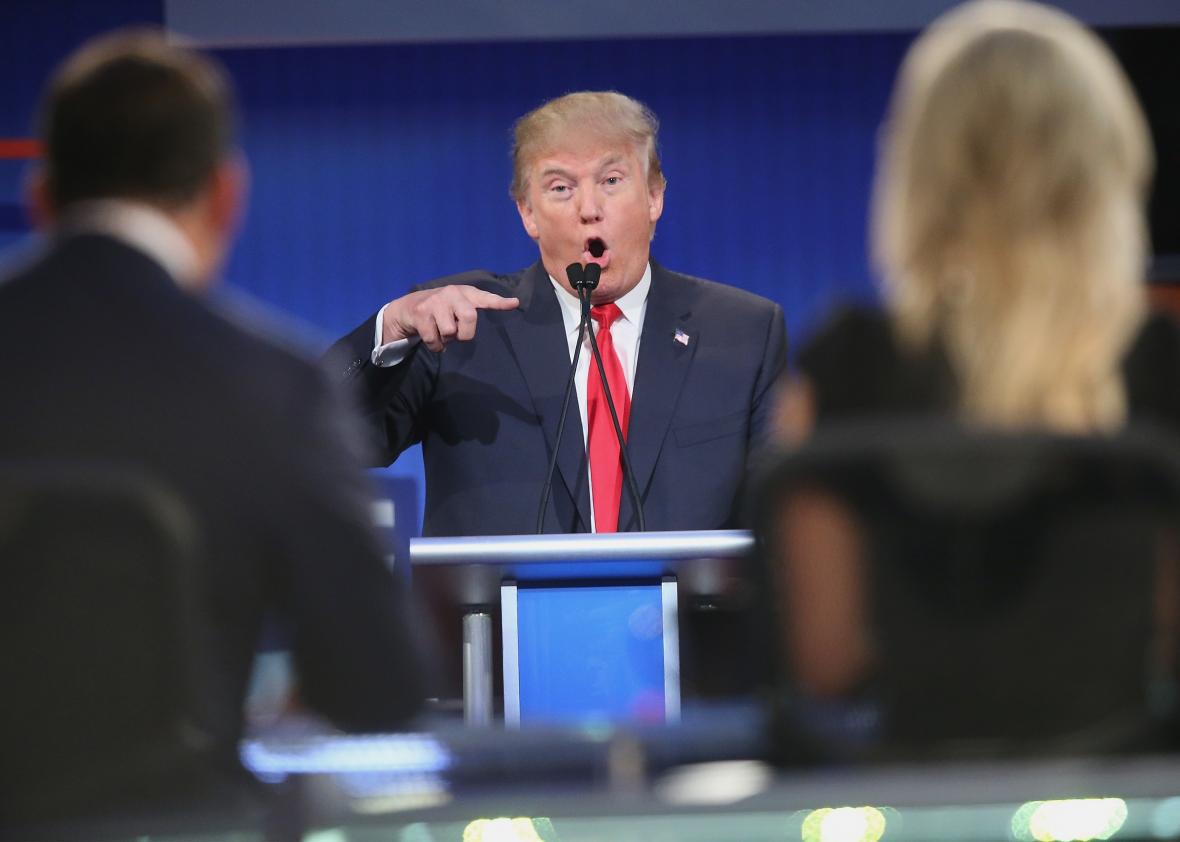None of what Donald Trump said in his interview with Don Lemon over the weekend was surprising. Calling in to CNN Tonight, with his voice booming over a photo of his grinning orange mug, he sounded, as always, like a man who was sure he had already won. The moment Lemon asked him whether he felt Fox News host Megyn Kelly—who had grilled him at last week’s GOP debate on his past remarks about women—was out to get him, he was off: “Certainly, I don’t have a lot of respect for Megyn Kelly. She’s a lightweight and y’know, she came out there reading her little script and trying to be tough and be sharp. And when you meet her you realize she’s not very tough and she’s not very sharp.” Then, came the kicker: “She gets out there and she starts asking me all sorts of ridiculous questions, and you could see there was blood coming out of her eyes, blood coming out of her … wherever.”
The outcry that followed was the stuff of Trump’s media-mongering dreams. “Donald Trump makes menstruation jibe at Megyn Kelly,” announced the Guardian. “Donald Trump’s ‘bloody’ slam of Megyn Kelly,” declared the Daily News. Even conservative writer Erick Erickson dumped Trump from the guest list of the RedState Gathering. Trump himself has insisted that he did not, in using the word “wherever,” actually mean to suggest that Kelly was on her period. Rather, as he later told the Today Show and CNN’s Jake Tapper, he meant that she was so angry that she seemed to be bleeding from some other orifice—like, say, a nose, or an ear.
To be clear, Trump sounded like a Grade A bozo throughout the Kelly tirade, and his history of enthusiastic sexism made the period subtext seem like a safe assumption. If you listen to the full segment, though, it is not entirely evident where Trump was going with that “wherever.” At the end of the sentence, he did sort of peter out, distracted by the gleam of his own next thought about how well he was doing in the polls. Several minutes later, he declared that Chris Wallace seemed to have “blood pouring out of his eyes” while interrogating him, too. It is no secret that Trump is a cartoonish misogynist. But the media frenzy over bloodgate also seemed to be missing some key context.
Trump’s Kelly comments were a sliver of a 30-minutes–long interview that rambled from his feelings on immigration, to the Republican National Committee, to the virtues of Matt Drudge. Overall, the interview was more than anything an extended boast about Trump’s own magnetism. He interrupted his Kelly diatribe to praise his own part in the Fox News debate’s massive viewership (“They call me the ratings machine”), and the success of The Apprentice. When he finally returned to Kelly, it was with a specific eye toward her perch in the cultural marketplace: “I just don’t respect her as a journalist. I have no respect for her. I don’t think she’s very good. I think she’s highly overrated.”
Overrated is one of Trump’s favorite insults. He has used it to burn many other public figures, from Charles Krauthammer to Bill Cosby. This makes sense, because the most notable feature of his worldview may be less his egomania or his general indecency than the way he regards the whole public sphere through the lens of ratings—it’s a realm of showmen and slobs, winners and losers, somebodies and nobodies. To Trump, all forms of renown are undifferentiated, all eyeballs equally desirable, whether directed toward a reality show or a presidential campaign. So overrated is the perfect encapsulation of his swaggering “us vs. them” mentality, his sense of his own impresario’s role in the culture. That, more than anything, was what seemed to be driving his loopy comments about Kelly. This is a man whose politics are exclusively personal, untainted by a single higher ideal. His Don Lemon interview was, as usual, a carnival of ad hominem jabs. “The dour George Will,” he said, “never has anything good to say about me, and I can tell you why: Something happened 12 years ago where I did a number on him. At least there I understand it.” That same day, he tweeted: “@FrankLuntz is a low class slob who came to my office looking for consulting work and I had zero interest,” after Luntz criticized him on the air. The brutal outlook that has fueled his whole campaign, the way he seems to assess the whole public arena as a field of prospects to hire or fire, is the same one that made The Apprentice such a hit.
There are countless times when Trump’s misogyny has been truly remarkable. Like when he mailed Gail Collins a copy of her column with the words “face of a dog” scrawled across her picture. There are the many examples, as Kelly pointed out during the debate, of Trump describing women as “fat pigs” and “disgusting animals.” He also called Kelly herself a “bimbo.” But this exchange with Don Lemon seemed less like an example of Trump’s bad, blanket treatment of women than one more boring data point in his grievance-fueled philosophy of life.
